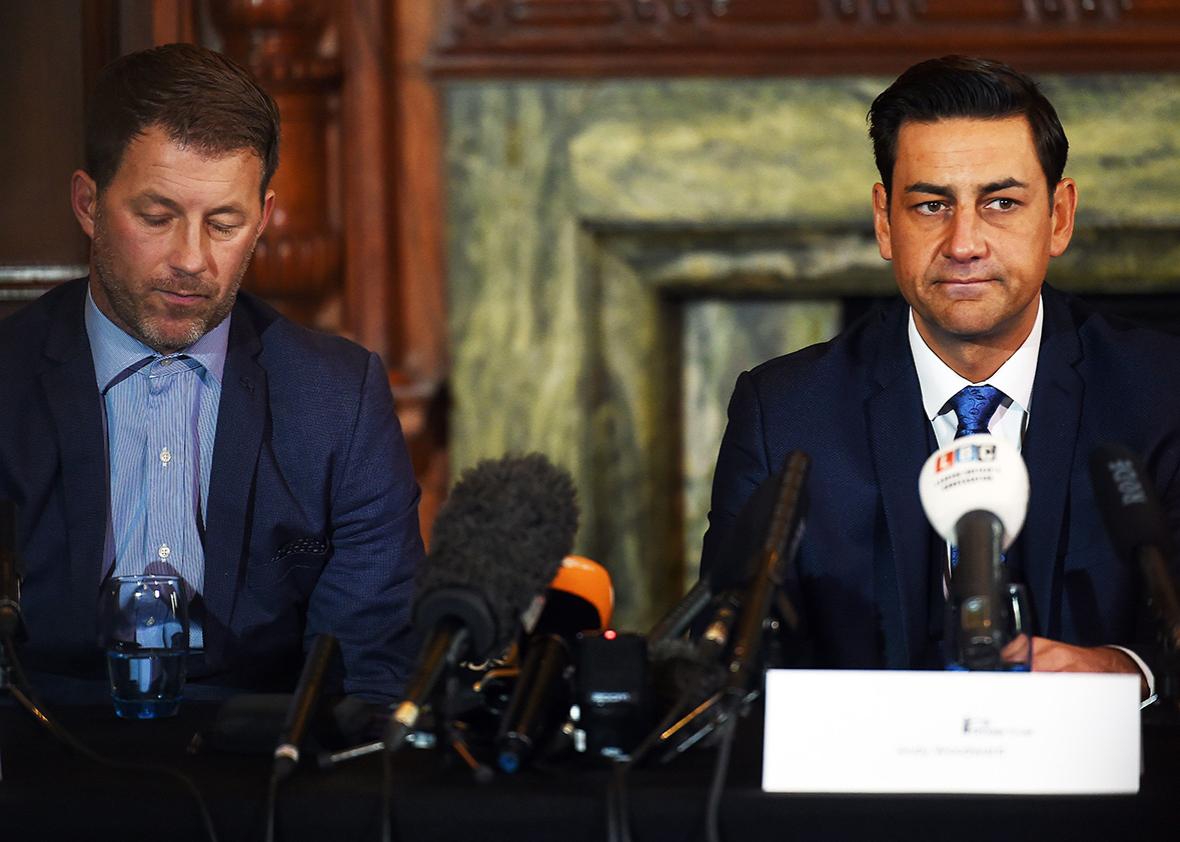Since the day he arrived in Britain in September 1996 to manage Arsenal, Arsène Wenger has been subject to intolerable abuse from opposition supporters, based on the groundless accusation that he is a pedophile.
It began when what sportswriter Oliver Holt calls “malicious and unfounded rumors” crept out of London’s financial district. Wenger, as a foreign coach with a serious demeanor who emphasized the development of young players, was a soft target for ignorant, loutish fans. “Sit down, you pedophile,” they cry still whenever he moves to the touchline. Unauthorized T-shirts on sale outside Chelsea’s stadium earlier this year featured a picture of Wenger wearing shorts above the slogan, “With a packet of sweets and a cheeky smile.”
Although Wenger claims to be “immune” to the vitriol, one might reasonably ask what England’s Football Association or the Premier League have done about it. The Guardian’s Marina Hyde asked this very question in 2009. Ex–Manchester United manager Alex Ferguson called for the chants to end in 2010, while ex–Arsenal defender Martin Keown demanded supporters who abused Wenger be barred from attending matches in 2012. Holt raised the issue again in 2014, two years before the T-shirts appeared. The chants continue. It’s been easier for the FA to ignore the demonization of an honorable man than confront fans and rid stadiums of this particular vulgarity.
It is against this backdrop that newly emerged reports of sexual abuse of trainee players by youth coaches and its subsequent cover-up by management can, in part, be better understood. As the persistence of the Wenger chants shows, the powers that be in English football have treated pedophilia as a joke rather than a scourge. It shouldn’t be a surprise, then, that so many youth players have felt compelled to hide their abuse for so long, not knowing if anyone in a position in authority would take them seriously.
Andy Woodward was the first to come forward in a November interview with the Guardian, revealing that while at Crewe Alexandra in the 1980s, that club’s youth coach Barry Bennell allegedly groomed, exploited, and sexually abused him. Bennell had a house in the country set up like “a treasure trove, a child’s dream,” including “a little monkey upstairs in a cage” and “a wild cat,” to which he would lure his victims who were under his tutelage, Woodward said. “[H]e’d use football to manipulate control. If I upset him in any way, he’d drop me from the team.”
Since that interview was published on Nov. 16, several other players have come forward with similar stories about Bennell, who was jailed in 1994, 1998, and 2015 for 25 separate offenses related to rape and sexual abuse of minors and charged again only last month with eight further counts of sexual assault against a young boy. (Bennell was fired by Crewe in 1992 for undisclosed reasons.) In total, figures released by police on Dec. 1 showed that 350 people have now made official complaints about cases of sexual abuse of minors in youth soccer, dating back as far as the 1970s and involving 55 professional and semi-professional clubs.
Clubs also stand accused of brushing stories of sexual abuse under the rug. Gary Johnson says Chelsea paid him $64,000 in 2015 not to go public about the alleged abuse he received at the hands of former chief scout Eddie Heath in the 1970s. An assistant manager is further alleged to have visited the parents of a youth team player who made a separate complaint against Heath (now deceased) to “smooth it over,” something he has denied. Newcastle United reportedly did little about coach George Ormond, an abuser of boys who worked in the club’s youth setup and was given six years in jail in 2002 on child molestation offenses. The judge in that case termed him a “predatory abuser.” The club appears to have simply moved him on but neither investigated nor tipped off the police.
To British ears, these reports will contain echoes of the scandal of Jimmy Savile, the radio and television personality who groomed children for decades while working at the BBC, where his child abuse was allegedly an “open secret.” Perhaps it is more instructive, however, to see this in a sporting context, with its parallels to the case of child molester Jerry Sandusky, who raped young boys on the campus of Penn State University. Pedophiles like Sandusky use sport as the pretext for sophisticated grooming operations, centering on the manipulation of authority over children whose future success depends on the benevolence of these near paternal figures.
This utter imbalance of power enabled Sandusky and others to silence their victims—as did the willingness of their superiors to look the other way. Sandusky’s serial sexual abuse became public in 2011, but court documents reflect that Penn State football coach Joe Paterno knew about it as early as 1976. When word of Bennell’s abuse inside soccer surfaced in a television investigation in 1997, the FA neither spoke to those who had alleged the abuse nor commissioned an inquiry. The so-called guardians of the game failed to protect those who needed it most, and they failed to investigate those whose actions imperiled hundreds of children.
Who will guard the guardians? Who will care for those who must be cared for? Positively, the abused have begun to speak for themselves. Woodward is one of the former players who have formed the Offside Trust, a common front that is at once a support network and a campaign for truth and justice. Perhaps only an initiative such as this will force the hand of both corrupted clubs and ineffectual institutions. The FA has now announced a review of child sexual abuse in soccer and has written to all 30,000 football clubs in England, but its record—including the failure even to do something about the hounding of Arsène Wenger—makes one wonder if they have it in them to put in place the measures that are needed.
